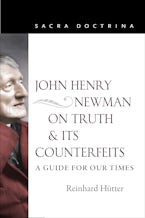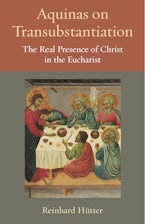- Home
- Sacra Doctrina
- religion
- John Henry Newman on Truth and Its Counterfeits
Preparing your PDF for download...
There was a problem with your download, please contact the server administrator.
John Henry Newman on Truth and Its Counterfeits
A Guide for Our Times
Sacra Doctrina
Imprint: Catholic University of America Press
Reinhard Hütter’s main thesis in this third volume of the Sacra Doctrina series is that John Henry Newman, in his own context of the nineteenth century, a century far from being a foreign one to our own, faced the same challenges as we do today; the problems then and now differ in degree, not in kind. Hence, Newman's engagement with these problems offers us a prescient and indeed prophetic diagnosis of what these problems or errors, if not corrected, will lead to—consequences which have more or less come to pass—and, furthermore, an alternative way which is at once thoroughly Catholic and holds contemporary relevance.
The introduction offers a survey of Newman’s life and works and each of the subsequent four chapters addresses one significant aspect of Christianity that is not only contested or rejected by secular unbelief, but also has a counterfeit for which not only Christians, but even Catholics have fallen. The counterfeit of conscience is the "conscience" of the sovereign subject (Ch. 1); the counterfeit of faith is the "faith" of one who does not submit to the living authority through which God communicates but rather adheres to the principle of private judgment in matters of revealed religion(Ch.2); the counterfeit of doctrinal development is twofold: (i) paying lip service to development while only selectively accepting its consequences on the grounds of a specious antiquarianism and (ii) invoking development theory to justify all sorts of contemporary changes according to the present Zeitgeist (Ch. 3). Finally, the counterfeit of the university are all those "universities" whose end is not to educate and thereby to perfect the intellect, but rather to feed more efficiently the empire of desire that is informed by the techno-consumerism of today (Ch. 4). The book concludes with an epilogue on Hütter’s journey to Catholicism.
Reinhard Hütter is ordinary professor of fundamental and dogmatic theology at The Catholic University of America and the author of seven previous books, including Bound for Beatitude and Aquinas on Transubstantiation (both CUA Press).
"Reinhard Hütter's main contribution in this volume is in the application of Newman's thought to contemporary problems, and to that portion of Newman studies that seeks to bring Newman into a wider theological discourse."
~Andrew Meszaros, author of The Prophetic Church: History and Doctrinal Development in John Henry Newman and Yves Congar
"Reinhard Hütter believes that we must fight today the same enemy that St. John Henry Newman fought in the nineteenth century, namely, the liberalism that proposes counterfeit versions of central Christian doctrines. Relying on Newman himself and a number of other figures from the Catholic tradition, he exposes the deeply misleading accounts of conscience, doctrinal development, and the nature of the university that hold sway in the contemporary academy and sometimes in the Church itself. This intelligent book makes for satisfying and bracing reading."
~Bishop Robert Barron, auxiliary bishop of Los Angeles and author of The Priority of Christ: Toward a Postliberal Catholicism
"A remarkable tour de force, impressively documented, on Newman's ‘counterfeits,’ yes, and on Aquinas and Newman face to face on conscience, faith, doctrine, and the university, topped with a compelling narrative of the author's seven-year ‘quintessentially Newmanian’ journey from Lutheranism to Catholicism. The principle of private judgement and its concomitant, the unfettered ‘sovereign subject’ of the present age, is the culprit common to all of the counterfeits."
~Mary Katherine Tillman, author of John Henry Newman: Man of Letters
"The ever-intriguing affinity of saints John Henry Newman and Thomas Aquinas helps give this book its solid intellectual appeal. The author’s courageous and penetrating defense of their compatibility renders it a major contribution to Newman studies. It will be especially appreciated by those interested in a Thomist-friendly look at what is most important in Newman’s thought. It will also appeal to Newman scholars who may need a refresher on Aquinas."
~Newman Studies Journal
"Hutter raises issues of the utmost seriousness for individuals, the Church, the larger society, and the university...This book is a superb and timely account."
~American Catholic Philosophical Quarterly



